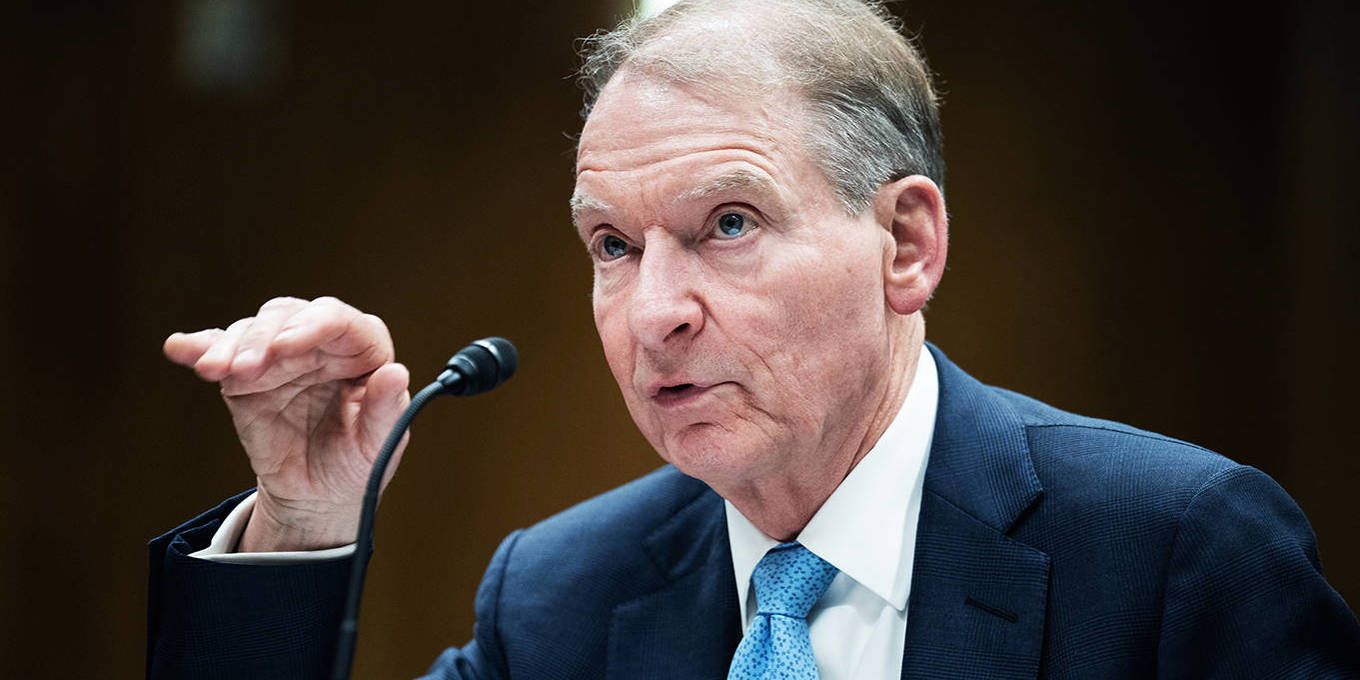Opinion
Answering Trump’s United Nations Challenge

Read more on post.
NEW YORK – America’s retreat from multilateralism, which President Donald Trump proudly emphasized in his speech this week to the United Nations General Assembly, and which is most clearly demonstrated by his administration’s dismantling of the United States Agency for International Development (USAID), has upended the institutions and norms that underpin the UN. Indeed, the viability of the UN Sustainable Development Goals (SDGs) is now in doubt, and calls to fill the gaps, particularly in funding, are growing more urgent.
Opinion
John McManus: Why am I paying my bin company so I can do its work?

Read more on post.
If you are a less than diligent customer of a certain bin company, you probably receive regular emails with links to photographs of your rubbish being emptied into the back of a their truck.
Your various sins against recycling are pointed out to you in a polite but disapproving tone.
You might get mildly annoyed over these emails on the basis that when you signed up as a customer of this company many years ago, you did not have to separate your glass or wash your yoghurt pots. Yet your bill has just gone up again.
And if you were approaching the grumpy old man period of your time on Earth, you could even find yourself wondering whether these changes are really for the benefit of the planet or the bin company. Work that the bin company used to do is now being transferred on to your shoulders, yet your bin charges have not gone down.
You might decide then and there to change bin company and ring up all its competitors – it won’t take long as there aren’t many – to find they charge pretty much the same price for the same service.
There is not much else you can do after that, other than to lie down for a while in a darkened room and listen to recordings of whale songs.
Whatever you do next, make sure you do not read a newspaper report that the Irish Waste Management Association (IWMA), which represents the bin companies, is opposing a proposal to reform the industry because it will damage competition. You will need something stronger than whale songs.
Ireland is unusual insofar as we do not directly regulate waste collection companies. There are plenty of laws bin companies must follow, but there is no single body charged with making sure they play fair and meet their obligations – as is the case with phone companies, energy companies and Uisce Éireann.
This surprisingly laissez-faire approach is attributed to the Government getting its fingers so badly burned in early 2000, when it tried to introduce charges for the bin collection services provided by local authorities. The political fallout rendered it a no-go area and led to the privatisation of collections.
We are also an outlier because we operate what is called a “side-by-side” system whereby bin companies are free to compete (or not compete) with each other to sign up customers anywhere they choose, although they tend to concentrate on certain areas.
Things may be about to change. The Department of the Environment has sought submissions from the public about changing to a system whereby companies will be required to compete for an exclusive fixed-term contract to collect bins in a particular region.
The period for making submissions has closed and consultants are due to report back in the spring. Don’t hold your breath.
The submissions have not been made public but according to a report in the Irish Independent, subsequently confirmed by a representative for the IWMA, the industry is against the proposal, arguing it would be bad for consumers because it will reduce competition. “It is inevitable that any change would result in increased costs on households already hit by cost-of-living increases,” the IWMA told the paper, presumably with a straight face.
It is not every day that you get businesses arguing against the chance to have a monopoly – albeit a regulated one. If anything, it should start the economic alarm bells ringing. But the bin collection business is not a typical business. Several big mergers in recent years have consolidated the industry to the point that the State competition watchdog has described it as broken.
[ Buy, eat, bin, repeat – we are locked in a never-ending flow of wasteOpens in new window ]
The Competition and Consumer Protection Commission (CCPC) has applied conditions to some of the mergers to lessen the impact on competition, but is firmly of the view that too much power is concentrated among too few players and that the industry needs to be regulated in the same way as other utilities.
A move to a franchise system would amount to the same thing and put enough of a fire break between the Government and the price of getting your bin collected to be politically plausible.
It might have been tempting to take the view that the bin companies’ lack of enthusiasm for change has something to do with the money they are making in the current unregulated free-for-all. It is reassuring to know they actually have the interests of their customers at heart. Second only to the interests of the planet, of course.
Opinion
“America First” Accounting Standards?

Read more on post.
LONDON – When it comes to international accounting standards, US authorities have long resembled Dr. Jekyll and Mr. Hyde. When the ordinary, well-adjusted Dr. Jekyll has been in control, the Securities and Exchange Commission has worked toward a convergence of US and international standards, even speaking optimistically about adopting the latter someday. By contrast, Mr. Hyde, the deranged alter ego, has tended to see international standards as a Trojan horse for undesirable foreign practices that would corrupt America’s “gold-standard” generally accepted accounting principles (GAAP).
Opinion
Starmerism has almost destroyed the Labour party, but I still have hope for renewal | Clive Lewis
Read more on post.

So choppy are the waters of the UK’s permacrisis, and so flat-bottomed the life raft known as Starmerism, that ideas once thought impossible at the outset of Keir Starmer’s initial soft-left, “Corbyn-in-a-suit” journey have become the defining realities of Labour’s present course. As its conference begins in Liverpool this weekend, the party must ask itself whether the political culture it is building is one that can inspire a country, or merely discipline it into compliance. Without a shift towards democracy, discussion and pluralism, Labour risks forfeiting the very moral and political authority it needs to confront the authoritarian voices shouting so loudly beyond our own ranks, and increasingly within them.
The Corbyn wave that swept Labour in 2015 was more than just a political surge. It was a redefinition of the possible, a moment when grassroots activism, radical ideas and the audacity of political hope took centre stage. It represented a demand for genuine democracy, pluralism and change. For many, it was the first time in living memory that Labour had felt like a movement rather than a machine. Today, Starmer’s absolute determination to distance Labour from that era speaks volumes.
The current party leadership views unity not as something cultivated through respectful dialogue and diverse perspectives, but something enforced through control. The Corbyn moment threatened Labour precisely because it signalled a party potentially ungovernable by conventional managerial methods. This is a party unsure how to reconcile democratic participation with electoral success.
Parliamentary candidate selections have been increasingly centralised, and grassroots members and leftwing voices within the party marginalised. A party once brimming with energy, ideas and volunteers has become a professionalised bureaucracy aimed at maintaining power rather than transforming society.
Labour’s aversion to pluralism is most obvious in its rejection of coalition politics. It wants to be an electoral juggernaut capable of winning alone or not at all. Yet contemporary crises – climate breakdown, authoritarian populism, stark economic inequality – demand cooperation beyond narrow party lines. Collaboration between Labour, the Greens, the Liberal Democrats and other progressive forces is not a sign of weakness, but maturity. And the stakes are as high as the very future of our democracy, our planet. Such a refusal to share power becomes not just strategically foolish, but morally questionable.
Nowhere is Labour’s aversion to transformative politics clearer than in its avoidance of public ownership. Consider water. Public opinion consistently favours renationalisation – not as nostalgia, but as a pragmatic response to corporate failures, ecological crises and profound erosion of trust in privatised utilities. Refusing public ownership signals abandonment of democratic control over our collective future, showing Labour’s alignment with a neoliberal orthodoxy that has repeatedly failed.
This alignment finds its starkest symbol in the party’s embrace of corporate influence. This undermines democracy itself by nourishing popular cynicism. When voters see politicians cosying up to the same firms that profited from the 2008 crash, the social contract frays further.
Labour’s timidity on the climate emergency underscores this problem further. This defining crisis of our times demands bold, courageous and imaginative responses. Yet Labour’s approach has been cautious and timid, perpetually afraid of alienating swing voters or corporate backers. Net zero is framed only in terms of competitiveness, not adaptation and survival. Green investment is promised, but always secondary to fiscal rules set by an economic consensus long past its sell-by date. While floods devastate communities and air quality worsens, Labour dithers.
Part of the problem is that the party is paralysed by institutional pressures and geopolitical alignments. Of course, balancing these forces is what makes for great governments and leaders. But Starmer has shown no such inclination. As prime minister, he faces substantial constraints, particularly regarding established alliances such as those with the US. But his careful neutrality over the humanitarian crisis in Gaza and quiet acquiescence to harsh immigration policies reflect an inclination toward diplomatic continuity rather than ethical clarityor moral leadership.
In this vacuum, the populist right seizes ground, offering nativist, nationalist solutions to problems that demand internationalist, ecological and equitable solidarity.
after newsletter promotion
And yet, despite these profound concerns, hope persists. Not because the current Labour leadership inspires it, but in spite of it. Hope survives in the growing networks of community organisers, cooperative movements, union branches, citizen assemblies and environmental campaigns. It flourishes in places ignored by Westminster – municipal projects reclaiming public land, local councils experimenting with participatory budgeting, workers organising in Amazon warehouses and Uber ranks. These spaces show that politics is not the property of party elites, but of people acting in concert to change their lives.
Ultimately, Starmerism risks rendering Labour unfit for the purpose it was created for: to give a political voice to working people and deliver collective solutions to collective problems. Openly addressing this is essential for Labour – and British politics broadly.
The crisis is real, yet so too is the potential for renewal. But that renewal cannot come from above. It must come from below – from a revitalised political culture that sees people not as voters to be harvested, but as citizens to be empowered. Recognising this is the first critical step toward a politics daring enough to imagine and urgently act upon the challenges we collectively face. And if this moment is indeed one of endings, then let it also be a moment of beginnings – a time to organise, to imagine and to build anew.
-
Clive Lewis is the Labour MP for Norwich South. This is an edited extract from Clive Lewis’s foreword to The Starmer Symptom, by Mark Perryman
-
Politics3 days ago
European Parliament snubs Orbán with vote to shield Italian MEP from Hungarian arrest
-
Culture3 weeks ago
Life, loss, fame & family – the IFI Documentary Festival in focus
-
Health4 days ago
EU renews support for WHO’s Universal Health Coverage Partnership
-
Environment6 days ago
Key oceans treaty crosses threshold to come into force
-
Culture3 days ago
Twilight at 20: the many afterlives of Stephenie Meyer’s vampires
-
Culture1 week ago
Farewell, Sundance – how Robert Redford changed cinema forever
-
Culture2 months ago
Fatal, flashy and indecent – the movies of Adrian Lyne revisited
-
Culture3 weeks ago
What is KPop Demon Hunters, and why is everyone talking about it?












































